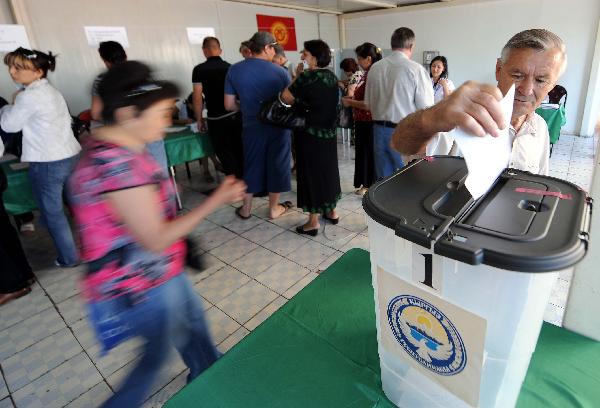Constitution referendum starts in Kyrgyzstan
Kyrgyz voters started to cast ballots in about 2,300 polling stations across the country on Sunday to determine the fate of a new constitution which would create a parliamentary democracy in Kyrgyzstan.
 |
|
People gather in a polling station to cast their ballots in Bishkek, capital of Kyrgyzstan, on June 27, 2010. Kyrgyz voters started to cast ballots in about 2,300 polling stations across the country on Sunday to determine the fate of a new constitution which would create a parliamentary democracy in Kyrgyzstan. [Xinhua/Sadat] |
The referendum started at 0800 local time (0200 GMT). The number of voters would reach 2.4 million, according to latest official figures.
The ballot asks voters two bundled questions -- do they support a new constitution that diminishes presidential powers and strengthens parliamentary authority; do they agree to endorse provisional leader Roza Otunbayeva as acting president for 18 months.
Voters need simply to check one box -- yes or no -- to answer both questions.
The core content of the new constitution is to transfer the country from a presidential system to a parliamentary democracy.
The new charter would give legitimacy to the Kyrgyz interim government that took power after former President Kurmanbek Bakiyev was ousted in April.
Outside the No. 1341 polling station near the Chuy street in Bishkek, some 30 voters waited earlier in the morning. After the national anthem of Kyrgyzstan was played, they began to vote under the instruction posted on the wall.
As a result of recent unrest that killed nearly 300 people and displaced tens of thousands more, the interim government lowered the turnout threshold to validate the voting results from 50 percent to no minimum.
According to the new rule, the new charter will be valid with 50 percent "yes" votes.
The government allocated a budget of 133 million som (about 3 million U.S. dollars) for the referendum and has carried out a propaganda campaign to advocate the event.
In Bishkek, in the southern city of Osh, and in the central-western province of Jalal-Abad, slogans like "Referendum: Create Life, Create Fortune," could be seen everywhere.
A total of 189 international observers representing more than 30 countries and 17 international organizations are monitoring the constitutional referendum.
The interim ministry of foreign affairs has accredited journalists from more than 30 foreign media outlets to cover the referendum.
 0
0 






